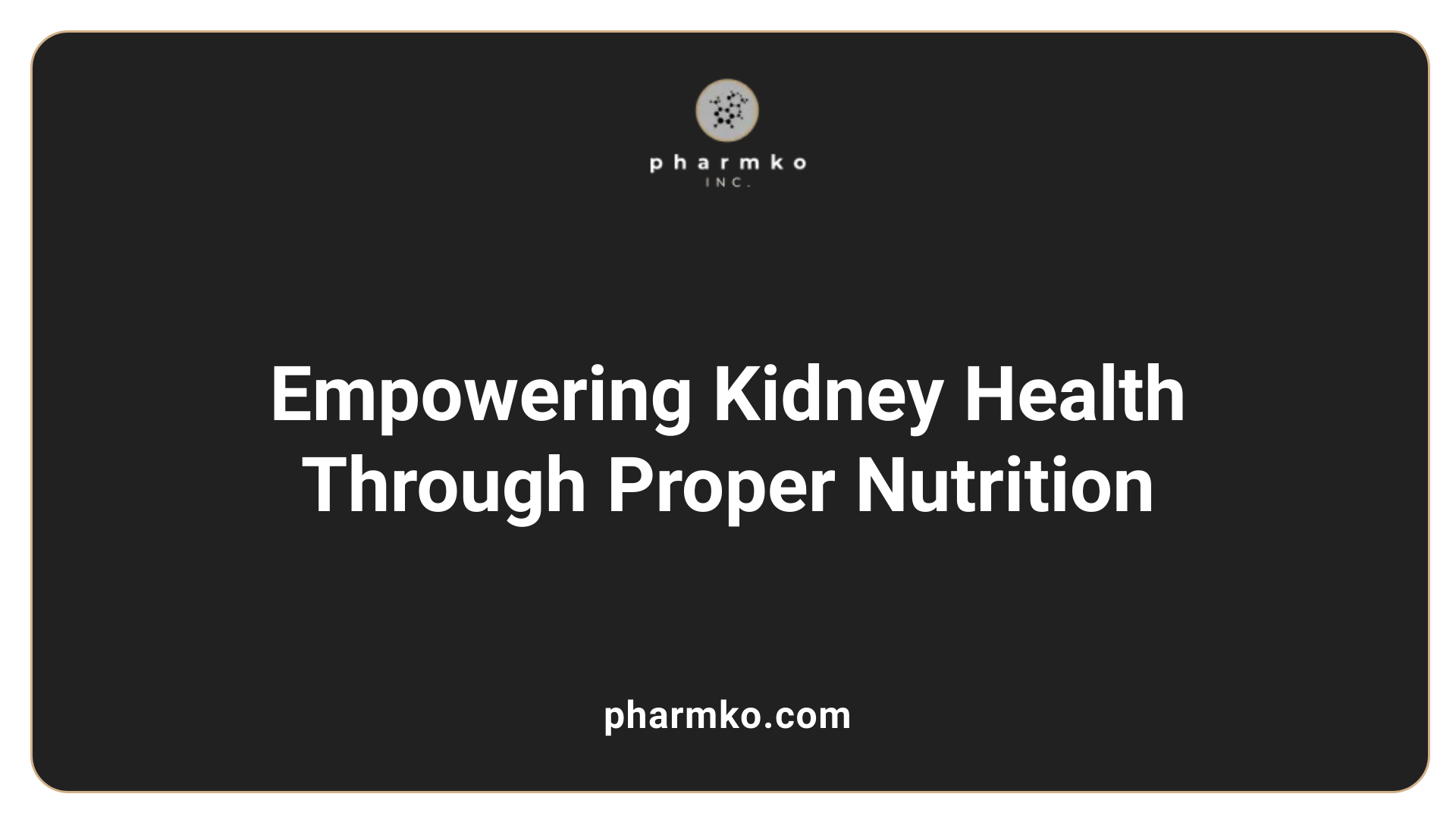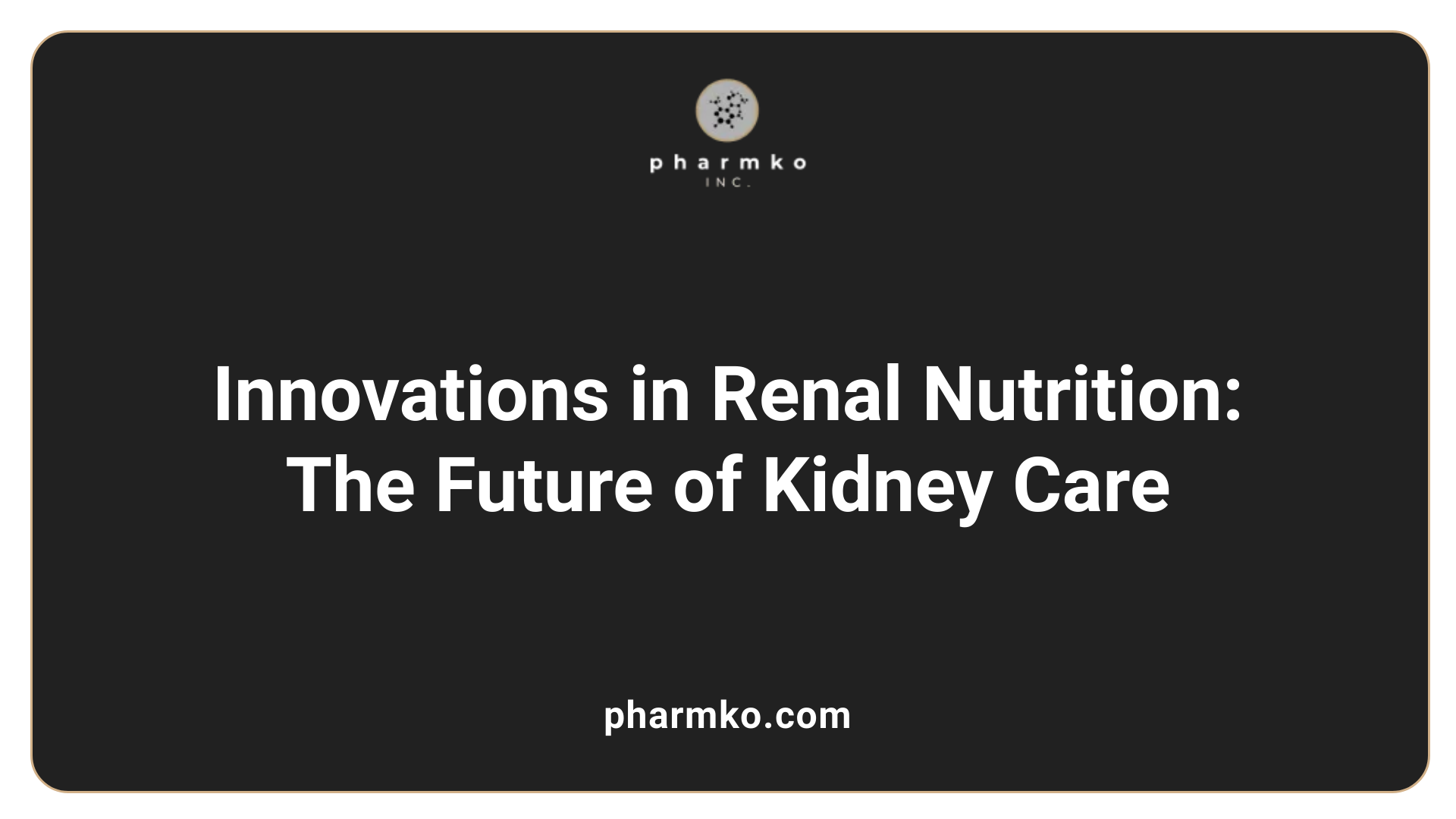Renal care and personalized nutrition
Understanding the Importance of Personalized Nutrition in Kidney Care
Chronic kidney disease (CKD) affects millions globally, with nutrition playing a pivotal role in managing its progression and improving patient outcomes. Personalized nutrition, tailored to individual dietary needs, has become integral in maintaining renal health and managing CKD effectively. This article explores the various dimensions of personalized nutritional interventions in renal care, including its impact on kidney function, dietary considerations, and the critical role of renal dietitians.
Nutritional Considerations for Chronic Kidney Disease

What are the nutritional considerations for individuals with chronic kidney disease?
Nutritional management for chronic kidney disease (CKD) is vital in maintaining kidney function and enhancing overall health. Protein intake is a critical consideration; a low-protein diet of 0.6 to 0.8 grams per kilogram of body weight per day is generally recommended to slow disease progression. Prioritizing high-biological-value proteins helps meet protein needs without overloading the kidneys.
Sodium and potassium intake must also be carefully managed. Sodium restriction is essential to control fluid retention and hypertension, which can worsen kidney function. Potassium levels should be tailored to each individual's needs due to the risk of hyperkalemia, which can lead to serious cardiovascular complications.
Additionally, managing phosphorus and calcium is crucial to prevent cardiovascular issues and mineral bone disorders associated with CKD. Overall, these dietary interventions can significantly enhance the quality of life for CKD patients and slow the progression of the disease. This underscores the need for personalized nutrition strategies that cater to individual health needs and dietary restrictions.
The Power of a Renal Diet in Promoting Kidney Health

How does a renal diet promote kidney function and slow the progression of kidney failure?
A renal diet is essential for individuals with compromised kidney function as it helps reduce the waste products in the blood that damaged kidneys cannot filter effectively. This diet is specifically low in sodium, phosphorus, and protein, which can help prevent fluid buildup, manage blood pressure, and minimize the risk of heart complications.
By emphasizing high-quality proteins, such as lean meats and fish, and limiting fluid intake based on individual needs, it supports better kidney function. This tailored approach requires regular monitoring, particularly of potassium and phosphorus levels, as excess amounts can lead to serious health issues, including weak bones and heart problems.
Nutrient restrictions and their benefits
The nutritional restrictions in a renal diet are designed to alleviate the strain on the kidneys. For instance, lower protein intake is common, especially for those in advanced stages of chronic kidney disease (CKD). This decrease helps to minimize the buildup of waste products. Furthermore, controlling sodium intake can prevent hypertension, while phosphorus restriction helps protect bones.
Impact on CKD progression
Adapting to a renal diet can significantly slow the progression of kidney failure. Studies suggest that a low-protein, plant-based diet may delay the need for dialysis and contribute to better overall health outcomes in CKD patients. By focusing on balanced nutrition, a renal diet enhances quality of life and promotes renal health.
The Role of Renal Dietitians in Personalized Care

What is the role of a renal dietitian in managing kidney health?
A renal dietitian plays a vital role in managing kidney health by providing specialized nutrition care tailored to individuals with kidney disease. They develop personalized meal plans based on patients' unique food habits, preferences, and specific health needs, ensuring they understand dietary restrictions necessary for maintaining kidney health.
Functions of renal dietitians
Renal dietitians engage in various functions, including:
- Nutritional Assessments : Evaluating patients' dietary preferences and health status to create effective nutritional interventions.
- Meal Planning : Customizing meal plans that align with the dietary restrictions of chronic kidney disease (CKD), such as low protein or low potassium diets.
- Monitoring Nutrient Intake : Continuously supervising patients' consumption of potassium, phosphorus, and sodium to prevent imbalances that could worsen kidney function.
Customizing dietary plans
Renal dietitians ensure that dietary plans are not one-size-fits-all. They consider factors such as:
- Stage of CKD : Nutritional needs vary depending on whether patients are in early or advanced stages of kidney disease.
- Comorbid Conditions : Factors like diabetes or hypertension often dictate the necessity for specific dietary adjustments.
Education on renal nutrition
Education is a key responsibility of renal dietitians. They:
- Empower Patients : Teach patients and caregivers how to make healthy food and fluid choices.
- Facilitate Understanding : Ensure that patients grasp the importance of adhering to nutritional guidelines to manage their condition effectively.
- Support Throughout Treatment : Provide guidance during treatment stages, including preparation for dialysis and post-transplant dietary adjustments.
Overall, renal dietitians work collaboratively with the healthcare team to optimize patient health outcomes through careful nutritional management.
Recommended Protein Sources for Kidney Disease Patients

What protein sources are recommended for people with kidney disease?
For individuals with kidney disease, especially those on dialysis, selecting appropriate protein sources is crucial to managing overall health and phosphorus levels in the blood. Low-phosphorus protein sources are preferred to prevent complications associated with elevated phosphorus levels, which can worsen kidney function.
Here are some recommended protein sources :
| Protein Source | Phosphorus Content | Notes |
|---|---|---|
| Skinless Chicken Breast | Low | Lean and versatile, great for grilling or baking. |
| Turkey Breast | Low | Another lean option, typically lower in phosphorus than red meats. |
| Fresh Pork Chops | Moderate | Opt for lean cuts to keep fat low. |
| Mahi Mahi | Moderate | Source of omega-3 fatty acids; check for specific phosphorus levels. |
| Shrimp | Moderate | Healthy and lower in fat; varies by preparation method. |
| Salmon | High | Rich in omega-3s, but phosphorus level varies; consume in moderation. |
| Egg Whites | Low | Excellent source of high-quality protein without added phosphorus. |
It’s essential to avoid high-phosphorus foods , such as dairy products and processed meats. Consulting with a renal dietitian can provide personalized dietary guidance on protein intake and help in meal planning to ensure kidney health is prioritized. Adjusting protein sources according to phosphorus content and individual health conditions will lead to improved management of kidney disease.
Emerging Research and Innovations in Renal Nutrition

Impact of personalized nutrition
Personalized nutrition has gained significant traction in managing chronic kidney disease (CKD) as it tailors dietary plans to fit individual health conditions and needs. Renal dieticians play a pivotal role in this process, creating specific meal plans that consider factors such as patient preferences, dietary restrictions, and metabolic parameters. This individualized approach fosters better adherence to diet regimens, potentially improving health outcomes for patients.
Recent scientific findings
Recent studies underscore the importance of nutrition in CKD. For instance, low-protein diets, particularly those enriched with plant-based proteins, have been associated with slowed CKD progression and improved overall health. Emerging evidence also points to the impact of dietary potassium and sodium on kidney management, emphasizing the need for a balanced intake. Additionally, personalized nutrition therapies have shown to preserve kidney function and enhance blood chemistry parameters in patients undergoing dialysis.
Innovative dietary approaches
New dietary strategies are making waves in renal nutrition. Programs incorporating telehealth consultations have been effective in providing personalized nutrition support. Patients benefit from access to registered dietitians who develop tailored meal plans addressing specific kidney challenges, such as managing sodium intake or increasing plant-based foods. These innovations not only support clinical outcomes but also empower patients in managing their renal health proactively.
| Dietary Strategy | Benefits | Target Population |
|---|---|---|
| Low-Protein Diet | Slows CKD progression; improves quality of life | CKD and advanced CKD patients |
| Plant-Based Diet | Reduces inflammation; may slow CKD progression | All stages of CKD |
| Telehealth Consult | Provides tailored nutritional support and education | Patients lacking local dietary resources |
Conclusion: The Future of Personalized Nutrition in Renal Care
The landscape of kidney care is evolving with personalized nutrition at its forefront. As insights into dietary impacts on kidney health expand, the role of individualized dietary plans becomes ever more crucial. Integrating precision nutrition with medical and lifestyle interventions holds promise for improving clinical outcomes and quality of life for CKD patients. Emphasizing tailored strategies and the involvement of renal dietitians can navigate patients through the complexities of renal health management, ensuring a holistic approach to care. As research progresses, these personalized interventions will continue to refine, enhancing kidney health and patient experiences globally.
References
- Precision Nutrition and Personalized Diet Plan for Kidney Health ...
- Personalized nutritional management in the transition from non ...
- Editorial: Personalized nutrition in chronic kidney disease - Frontiers
- Personalized nutritional management in the transition from non ...
- Personalized Nutrition in Chronic Kidney Disease - Frontiers
- Personalized Nutritional Therapy: How It Can Help Your Patients
- Personalized nutritional management in the transition from non ...
- Patients with ESKD under conservative care can benefit ... - Healio
- Chronic Kidney Disease Prevention Made Easy: Insurance-Covered ...













